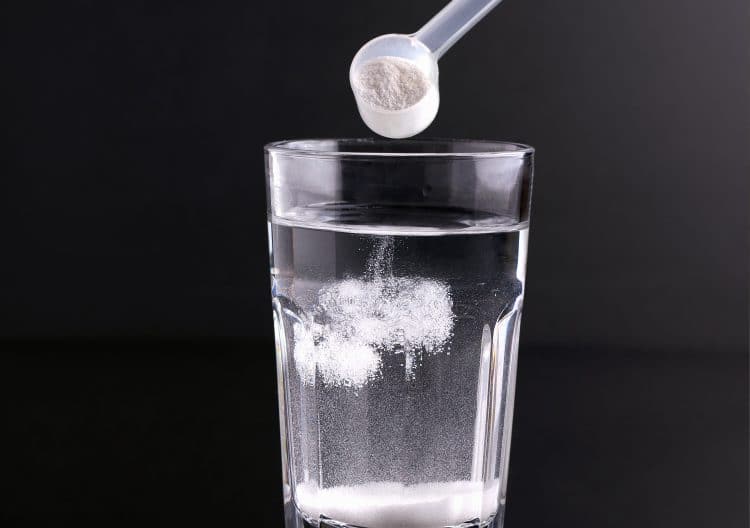Contrary to what a lot of people think, performance-boosting supplements are nothing new. In fact, for as long as humankind has existed, people have been looking for ways to enhance their strength, endurance, and energy.
Take the ancient Vikings, for example. Warriors called Berserkers used a herb called bog myrtle to increase aggression and eliminate fear. In fact, it’s the use of this herb that gives us the common expression “going berserk,” meaning to lose control.
South American hunters and warriors used to chew raw coca leaves, which is an unrefined form of the drug cocaine, for energy and focus during periods of prolonged physical activity.
And who hasn’t had a cup of strong tea or coffee to power through a long drive or pull a study-hall all-nighter before a big exam? Caffeine is the original performance-boosting energizer!
There are hundreds of different types of supplements around, and exercisers use them for a variety of reasons. Some products speed up recovery, while others allow you to work out harder or longer than usual. The end result is usually better, faster progress.
Some people prefer not to use supplements, and that’s okay, too; supplement use is NOT compulsory! But many exercisers enjoy the benefits of these primarily safe and effective products.
On the downside, supplements can sometimes have unwanted side effects. Fortunately, these side-effects are rarely serious and just cause mild discomfort, such as itchiness, short-term insomnia, or mild stomach cramps. Most side effects usually vanish when you stop taking the culprit supplement.
However, some may have more frustrating side effects – and may even work against you.
In this article, we reveal if pre-workout can make you gain weight.
What is Pre-Workout?
Pre-workouts are a very popular type of supplement. Lots of exercisers like to take a scoop or two before training so they can exercise harder and longer than usual. Whether you are a bodybuilder, powerlifter, or just working out for fat loss, training harder and longer should make your workouts more productive.
However, longer, more intense workouts can take a lot out of your body. So, if you use a pre-workout, you’ll also need to pay more attention to rest and recovery. If you don’t, you run the risk of becoming overtrained. Using a pre-workout should be balanced with a healthy diet and getting sufficient sleep.
The main benefits of using a pre-workout before training are:
- Noticeable increase in energy
- More endurance and less fatigue
- Increased focus, motivation, and aggression
- More reps per set
- A better pump and increased vascularity
- Greater strength and power
- Faster recovery
Different pre-workout products use different ingredients to boost workout performance. Still, most are powders designed to be mixed with water and consumed shortly before hitting the gym.
Common pre-workout ingredients include:
Caffeine:

Most pre-workout supplements contain caffeine. The amount can vary from 100mg to 400mg+ per serving. A standard cup of coffee contains about 150mg of caffeine. Caffeine is a powerful energizer that also fights fatigue and increases fat burning. It’s so potent that, up until the 1960s, caffeine was on the Internarial Olympic Committees’ list of banned and controlled substances.
On the downside, a big hit of caffeine can leave you feeling anxious and jittery. Some pre-workouts contain L-theanine, which helps to “smooth” the effect of caffeine, lessening any unwanted side effects.
Some pre-workouts are caffeine-free and designated non-stim (non-stimulating). However, these products are not usually as potent as pre-workouts that contain caffeine.
Nitric oxide boosters:
Nitric oxide relaxes the smooth muscles of your blood vessels, increasing blood flow. This increases endurance, speeds up recovery, and also improves your pump. Using a pre-workout may make your biceps veins more visible. Nitric oxide boosting ingredients include beetroot extract, L-arginine, and L-citrulline.
Beta-alanine:

Beta-alanine is an amino acid that, in your body, combines with another amino acid called histidine to make carnosine. Carnosine is a proven fatigue fighter and performance booster.
Taking a pre-workout containing beta-alanine is especially useful during short bouts of intense training, such as lifting weights and HIIT, allowing you to train harder and longer and also recover more quickly between sets and intervals.
In simple terms, beta-alanine reduces the acidity in your muscles, counteracting some of the fatiguing effects of lactic acid. It’s this “buffering effect” that allows you to pump out a couple of extra reps after using pre-workout.
However, in doses of 500mg or more, beta-alanine can trigger skin flushing and paraesthesia (tingling/itchiness). This sensation is harmless and causes no long-term side effects. However, some people find itchy, flushed, tingly skin uncomfortable or even distracting.
Creatine:

One of the most widely used and well-researched supplements on the planet, creatine has been shown to increase muscle strength, size, and endurance. It may also increase fat burning and enhance cognition and focus.
The effects of creatine are mostly cumulative, as it takes a while to build up in your body. That said, even small, irregular doses of creatine may help boost short-term exercise performance.
Use our online calculator to determine your ideal creatine dose.
Pre-Workouts and Weight Gain
There are lots (and we mean LOTS!) of different pre-workout supplements, and they are all formulated slightly differently. That said, they’re also all designed to do the same thing – allow you to train harder and longer.
Some pre-workouts contain no caffeine, while others provide 400mg or more per serving. Others are free from ingredients that could make your skin itch, and some have it in abundance.
However, almost all pre-workouts contain no sugar, carbs, protein, or fat and are calorie-free. They’re artificially or naturally flavored and sweetened (often both) and should not cause weight gain in most people.
So why do some users still gain weight after using a pre-workout? Let’s investigate!
Increased water retention

Your hydration levels fluctuate throughout the day. When your body stores a lot of water, you’ll weigh more. But, after urinating or heavy sweating, you’ll weigh less. One liter of water weighs one kilo, or about 2.2 pounds. So, not only is water pretty heavy, it’s easy to see how losing (or gaining) water can have such a significant impact on your body weight.
Some pre-workouts contain creatine, which is a proven performance booster. However, in the standard form of creatine monohydrate, this substance can cause increased water retention.
This increase in water is no bad thing because it makes your muscles look bigger. However, it could also be the reason that you are gaining weight.
The good news is that there are some pre-workouts that contain no creatine, which should eliminate this problem.
Increased muscle mass
Unsurprisingly, if you start training harder and longer, you may experience increases in muscle mass. Like water, muscle tissue is heavy, and as your muscles grow, you’ll start to gain weight. Most exercisers can gain 1-2 pounds of muscle weight per month.
This source of weight gain is no bad thing and shows that your training is working. Gaining muscle will enhance your shape and could even speed up your metabolism for faster fat loss.
Needless to say, most bodybuilders will celebrate gaining muscle mass. However, some exercisers exercise for weight maintenance or loss, and unexplained weight gain can be distressing.
Don’t train like a bodybuilder if you are concerned about gaining muscle! High-intensity strength training triggers muscle growth, and it’s hard to avoid if you are working out regularly and consistently.
To lift weights without building additional muscle mass, stick to full-body workouts, light weights, and 2-3 sets of 15-20 reps per exercise, stopping a few reps short of hitting failure.
Overeating and fat gain

Your body is very good at regulating your appetite based on the amount of energy you expend per day. The more active you are, the more likely you are to be hungry. But, of course, some people are less in touch with their appetites than others and overeat even though they are mostly sedentary, but that’s a whole different topic!
Pre-workouts allow you to exercise harder and longer than usual, which may result in increased hunger. If you reward yourself with more food, maybe an unplanned cheat meal, your body will convert any unused calories to fat, and your weight will increase.
The best way to avoid this type of weight gain is to track your calorie intake and macros to ensure that you’re not providing your body with more energy than it needs. Satisfy your increased hunger with low-calorie, high-protein snacks rather than junk food.
More on pre-workouts:
If you want to learn more about pre-workout supplements, we have an entire pre-workout section that we recommend you check out!
- Best Pre-Workouts for every category and goal
- Best Pre-Workouts for Weight Loss
- Best Pre-Workouts Without Creatine
- Best Tasting Pre-Workout Supplements
- Strongest Pre Workout Supplements
- Best Caffeine-Free Pre-Workout Supplements
- Best Pre-Workouts Without Beta-Alanine
- Best Pre-Workouts For Beginners
- Creatine vs. Pre-Workout
Pre-Workout and Weight Gain – Wrapping-Up
Used correctly and combined with a well-designed workout program and a sensible diet, pre-workouts should not cause weight gain. However, if your pre-workout stimulates you to eat more food than usual, you may find your weight increasing.
In contrast, pre-workouts CAN lead to weight gain by increasing muscle mass or causing water retention. Increased muscle mass is an often-inescapable side-effect of exercise and is usually a good thing. But, if you don’t want to gain muscle mass, don’t train like a bodybuilder!
You can avoid water retention by using a creatine-free pre-workout.
Are you still gaining weight and not sure why? Check out our in-depth article Why Am I Gaining Weight? Common Causes Of Unexpected Weight Gain


